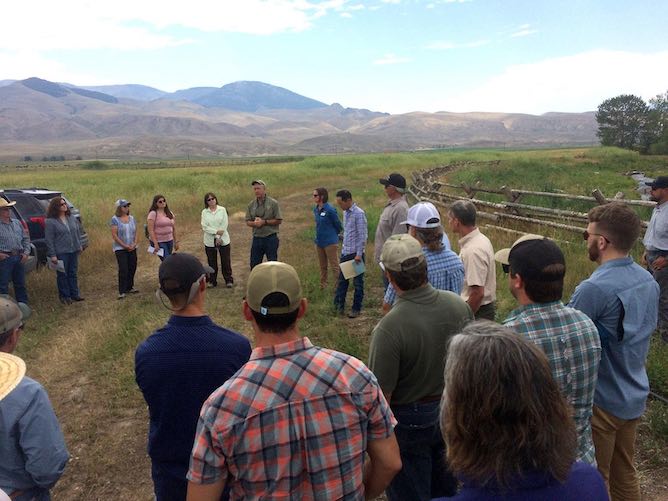forum
library
tutorial
contact

Fish Work Group Discusses
Salmon, Steelhead Efforts
by Laura Zuckerman
Challis Messenger, August 7, 2019
|
the film forum library tutorial contact |

|
Fish Work Group Discusses
by Laura Zuckerman
|
"Think only of the fish," said North Fork resident John Molloy.
 SALMON -- Local people told a panel addressing the state's declining salmon and steelhead runs that there was no time to waste and no legal action that should be ruled out in an effort to save the fish that once crowded many Idaho rivers.
SALMON -- Local people told a panel addressing the state's declining salmon and steelhead runs that there was no time to waste and no legal action that should be ruled out in an effort to save the fish that once crowded many Idaho rivers.
Speaking July 31 before the Salmon work group initiated by Idaho Gov. Brad Little, North Fork resident John Molloy urged the panel -- whose members represent everything from environmental to agricultural communities -- to set aside any differences.
"Think only of the fish," he said.
Molloy's were among comments made on the second of two days of meetings in Salmon that highlighted local habitat improvement projects and restoration efforts designed to aid the fish. Molloy applauded efforts by government and other organizations and local landowners but likened upgrading conditions for fish that fail to appear in any sizable number because of problems elsewhere in the Columbia River Basin to adding more rooms to a motel with no occupants.
"We're building the motels but no one's coming," he said.
Young salmon and steelhead swim from their birth streams in Idaho to larger water bodies like the Salmon and Snake rivers and down the Columbia River in Oregon and Washington in a push for the Pacific Ocean. The ancient migration of the fish, born in fresh water but undergoing a metamorphosis that allows them to live and feed in saltwater, once took a matter of days but now takes months. The process has been stretched because the weakening, cold-water fish attempt to overcome such challenges as hydroelectric dams, slow-moving reservoirs that make them easy prey for predators and a raft of habitat degradation that includes dewatering of streams for irrigation and other purposes.
If the fish successfully navigate their way to the Pacific and are not harvested by commercial and sport fishermen or otherwise killed, they mature and undergo physiological changes that allow them to embark on an upstream migration that will see them return to the freshwater streams where they were born in order to spawn.
Anglers and environmental advocates who spoke at last week's meeting referred to periods in the distant past in which the state supported robust salmon and steelhead fisheries and suggested their recovery would bring untold economic, recreational and cultural benefits.
Dave Dickinson of Challis was one of several anglers who said the problems facing Idaho's prized fish originate downstream and include the hydroelectric dams operated by such entities as the Bonneville Power Administration.
He urged legal and other action, adding, "Idaho needs to send a message. We want Idaho salmon to return to our state."
Other speakers argued that utilities, ranchers and groups whose practices can contribute to the fish struggles are not to blame for such threats as warming streams and said they were making substantial efforts to restore the fisheries.
Ken Dizes, general manager of Salmon River Electric Cooperative, underscored the importance of the BPA to ratepayers with the co-op and defended its stance.
"We are all about the fish; we love our salmon," he said.
Zak Miller of the Idaho Farm Bureau told the panel that its members would "zealously defend the rights (to use) public lands and water rights."
Last week's meeting came on the heels of a forecast by Idaho Department of Fish and Game biologists for another year of poor returns of large steelhead to the Snake and Clearwater rivers and its tributaries, underscoring the urgent need to find a solution for Idaho's salmon and steelhead, according to Justin Hayes. Hayes is the Idaho Conservation League's executive director and a member of the governor's work group.
"Idaho's fish are in crisis right now. Poor returns are the new normal so we need to act urgently," Hayes said.
Besides Wednesday's discussions, the gathering included tours of habitat projects in Lemhi and Custer counties where work group members and others saw efforts to save Idaho's fish.
"Tribes, conservationists, landowners, irrigators, government agencies and other Idahoans have created the most amazing habitat on Earth for our fish. Good work has been done, and we need to do more," Hayes said in a news release.
"What we heard today was that if we are going to recover salmon and steelhead, we need to focus on all of the things that are limiting our fish. This includes habitat and also hydropower, hatcheries and harvests. By tackling these issues in Idaho and the region, we hope to find win-win solutions together for salmon and steelhead restoration that are equitable, just, sustainable, and prosperous for all Idahoans," Hayes said.
learn more on topics covered in the film
see the video
read the script
learn the songs
discussion forum
